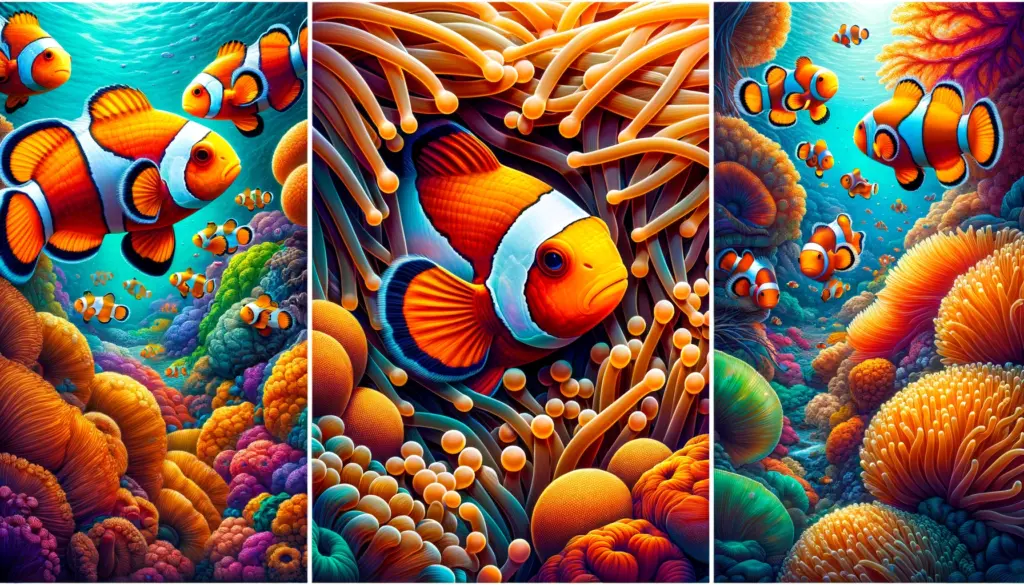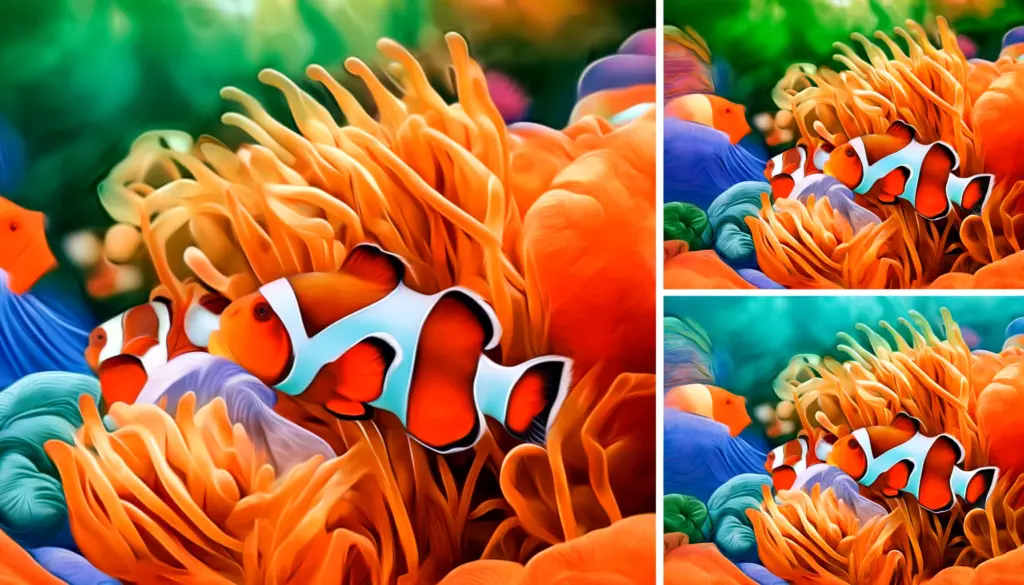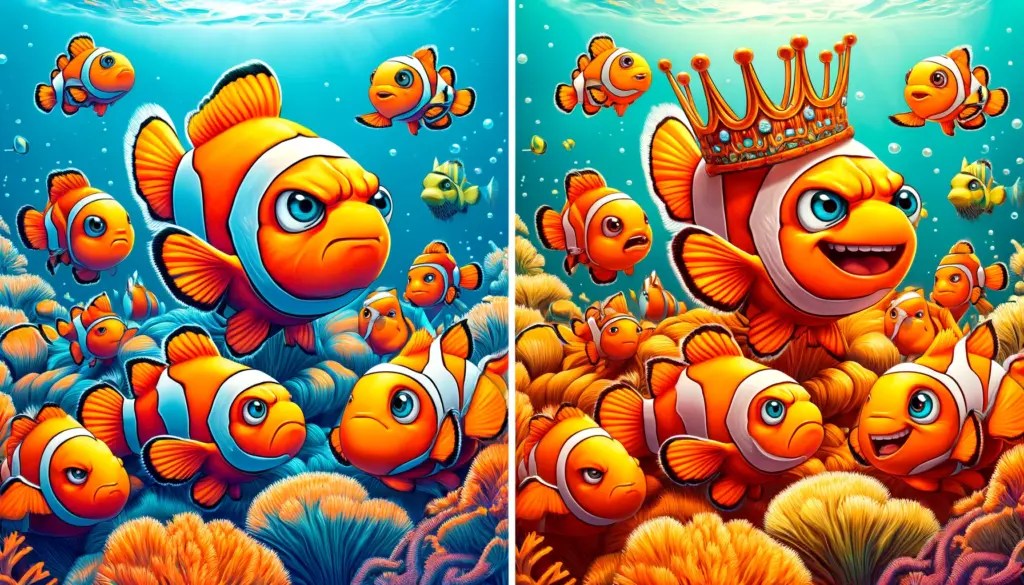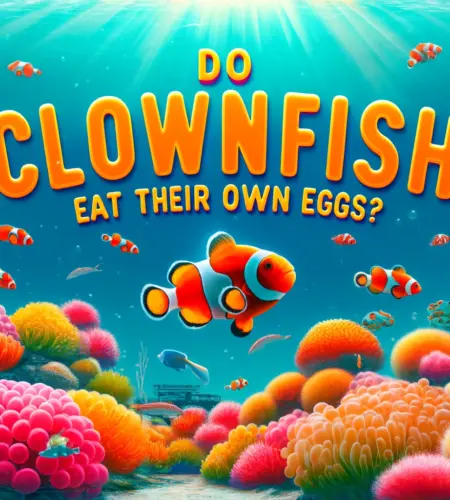Introduction
Do clownfish eat their own eggs? This is a common question for people who keep clownfish in home aquariums. Understanding clownfish behavior can help you take better care of them and ensure their eggs hatch successfully.
In this guide, you’ll learn about clownfish behavior, why they might eat their own eggs, and how to prevent this from happening.
Table of contents
- Introduction
- Understanding Clownfish Behavior
- Clownfish Reproduction Cycle
- Do Clownfish Eat Their Own Eggs?
- Stress Factors Affecting Clownfish
- Preventing Clownfish from Eating Their Eggs
- Tank Conditions and Care Tips
- Common Myths about Clownfish and Egg Eating
- Observing Clownfish Behavior
- FAQs
- Final Thoughts: Do clownfish eat their own eggs
Understanding Clownfish Behavior
Clownfish are known for their interesting behavior. They are social fish that live in groups and have complex interactions with each other.

General Behavior of Clownfish
- Territorial Nature: Clownfish are very territorial and often stay close to their home, usually an anemone.
- Social Structure: They have a strict social hierarchy, with the largest and most dominant fish being the female, and the second largest becoming the male.
- Symbiotic Relationship: Clownfish have a symbiotic relationship with sea anemones, which provide them protection from predators.
Reproductive Habits of Clownfish
- Monogamous Pairs: Clownfish form monogamous pairs and often stay with the same partner for life.
- Egg Laying: Female clownfish lay hundreds of eggs at a time on flat surfaces near their anemone.
- Parental Care: Both the male and female take part in caring for the eggs, with the male often taking on the primary role of guarding and aerating them.
Clownfish Reproduction Cycle

How Clownfish Lay Eggs
- Selection of Site: The female clownfish carefully selects a flat surface near their anemone to lay her eggs.
- Egg Laying Process: The female lays the eggs in clusters, and the male follows behind to fertilize them.
- Egg Care: The male clownfish spends most of his time near the eggs, fanning them with his fins to keep them oxygenated and free from debris.
The Role of Male and Female Clownfish in Egg Care
- Male’s Role: The male is responsible for most of the egg care. He fans the eggs to keep them clean and oxygenated and guards them from predators.
- Female’s Role: The female helps protect the nest and ensures the safety of the eggs but does less direct care compared to the male.
Do Clownfish Eat Their Own Eggs?
Yes, clownfish can eat their own eggs, although it’s not very common. Several factors can cause this behavior.
Reasons Why Clownfish Might Eat Their Own Eggs
- Stress: High levels of stress can cause clownfish to eat their own eggs. Stress can come from poor water conditions, lack of food, or disturbances in their environment.
- Egg Quality: If the eggs are not viable or are damaged, the clownfish might eat them to reduce waste and make room for new eggs.
- Overcrowding: In a crowded tank, clownfish might eat their eggs to reduce competition and ensure that the strongest offspring survive.
Stress Factors Affecting Clownfish
Environmental Stress and Its Impact
- Water Quality: Poor water quality can stress clownfish. It’s important to keep the water clean and maintain proper pH levels.
- Tank Size: A tank that is too small can stress clownfish. Ensure your tank is large enough for your fish to swim freely.
- Noise and Vibrations: Clownfish are sensitive to noise and vibrations. Too much noise can stress them out and affect their behavior.
Poor Tank Conditions Leading to Egg Consumption
- Inadequate Hiding Spots: Clownfish need places to hide and feel secure. Without enough hiding spots, they can become stressed and eat their eggs.
- Lack of Proper Diet: A poor diet can lead to stress and poor health in clownfish, which may cause them to eat their own eggs.
Preventing Clownfish from Eating Their Eggs
How to Create a Stress-Free Environment for Clownfish
- Maintain Water Quality: Regularly check and maintain the water quality in your tank. Keep the pH, ammonia, nitrate, and nitrite levels in check.
- Provide Hiding Spots: Ensure there are plenty of hiding spots in the tank. Use decorations, plants, and other structures to create a safe environment.
- Stable Environment: Keep the tank in a quiet place with minimal disturbances. Avoid placing the tank near loud appliances or heavy foot traffic areas.
Tank Conditions and Care Tips

Ideal Water Conditions for Clownfish
- Temperature: Keep the water temperature between 75°F and 82°F.
- Salinity: Maintain a salinity level of 1.020 to 1.025 specific gravity.
- pH Levels: The ideal pH level for clownfish is between 8.0 and 8.4.
Tips for Feeding and Caring for Clownfish to Prevent Egg Consumption
- Balanced Diet: Provide a balanced diet that includes high-quality pellets, frozen foods, and occasional live foods.
- Regular Feeding: Feed your clownfish small amounts 2-3 times a day to keep them healthy and reduce stress.
- Monitor Behavior: Keep an eye on your clownfish’s behavior. If you notice signs of stress, take steps to address the issue immediately.
Common Myths about Clownfish and Egg Eating

Debunking Myths Related to Clownfish Behavior
- Myth: Clownfish Always Eat Their Eggs: This is not true. Clownfish only eat their eggs under certain stressful conditions or if the eggs are not viable.
- Myth: Clownfish Need Large Tanks: While a larger tank is better, clownfish can thrive in smaller, well-maintained tanks as well.
- Myth: Clownfish Don’t Need Anemones: While clownfish can survive without anemones, having an anemone in the tank can reduce their stress and improve their overall health.
Facts vs. Myths about Clownfish Eating Their Own Eggs
- Fact: Clownfish may eat their eggs if they are stressed or if the eggs are not viable.
- Fact: Proper tank conditions and a balanced diet can help prevent clownfish from eating their own eggs.
- Myth: All clownfish will eat their eggs regardless of conditions. This behavior is not universal and depends on the individual fish and their environment.
Observing Clownfish Behavior
How to Monitor and Understand Your Clownfish
- Daily Observation: Spend a few minutes each day observing your clownfish. Note any changes in behavior or appearance.
- Behavioral Signs: Look for signs of stress such as hiding, erratic swimming, or loss of appetite.
- Record Keeping: Keep a log of water conditions, feeding schedules, and any changes in behavior. This can help you identify patterns and address issues promptly.
Recognizing Signs of Stress in Clownfish
- Color Changes: Stressed clownfish may lose their bright colors.
- Reduced Activity: Clownfish that are stressed might become less active or hide more often.
- Breathing Rate: Rapid or labored breathing can be a sign of stress in clownfish.
FAQs
Clownfish might eat their own eggs if they are stressed or if the water conditions are poor. Sometimes, they eat the eggs if they think they are not healthy. Keeping the tank clean and giving them a good diet can help stop this behavior.
Clownfish usually lay eggs every two weeks if the conditions are good. The exact timing can change based on factors like the water quality and the food they get. Regular care and a stable environment help maintain their breeding cycle.
Clownfish eggs are tiny, clear, and grouped together. As they develop, they change color, starting from clear and turning darker as the baby fish inside grow. This color change helps you know they are developing properly.
Clownfish eggs usually hatch in about 6 to 10 days. The exact time depends on the temperature of the water and other conditions in the tank. Warmer water can speed up the hatching process, while cooler water can slow it down.
Yes, you can reduce the chances of clownfish eating their eggs by keeping the water clean and stable. Providing a stress-free environment and ensuring they have enough food also helps. Healthy and happy clownfish are less likely to eat their eggs.
Clownfish generally do not eat their babies. However, if the baby fish are sick or weak, the parents might eat them to protect the healthier ones. Keeping the tank clean and the fish healthy can help prevent this.
Clownfish protect their eggs by fanning them with their fins to keep them clean and provide oxygen. They also guard the eggs from predators and other threats. This care helps ensure more eggs survive to hatch.
In a tank, clownfish eat various foods such as high-quality pellets, frozen foods like brine shrimp and mysis shrimp, and sometimes live foods. A balanced diet keeps them healthy and happy.
A female clownfish can lay between 100 to 1,000 eggs at a time, depending on her size and health. The number of eggs can vary with each spawning, but larger and healthier females usually lay more eggs.
Yes, clownfish can breed in captivity if they have a good environment and are healthy. Keeping the tank conditions right and providing a balanced diet are key to successful breeding. Proper care helps mimic their natural breeding conditions.
Final Thoughts: Do clownfish eat their own eggs
Do clownfish eat their own eggs? Yes, but understanding why this happens and how to prevent it is key. Maintaining a clean, stress-free environment and providing proper care can help ensure your clownfish’s eggs hatch successfully.
Keep an eye on their behavior, and with the right conditions, you can enjoy the fascinating process of clownfish breeding in your own aquarium.

